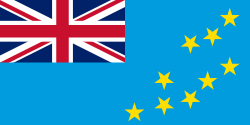Religion in Tuvalu
The Church of Tuvalu, (Te Ekalesia Kelisiano Tuvalu) is the state church of Tuvalu, although in practice this merely entitles it to "the privilege of performing special services on major national events".[1] Theologically the Church of Tuvalu is part of the Reformed tradition.
| Part of a series on the |
| Culture of Tuvalu |
|---|
 |
| History |
| Languages |
| Cuisine |
| Religion |
| Art |
|
Music and performing arts |
| Sport |
|
Symbols |
|
Its adherents comprise about 97% of the 10,837 (2012 census) inhabitants of Tuvalu.[2][3] All Islands of Tuvalu have traditional chiefs (alikis) who are members of the Church of Tuvalu.[4] Most followers of other religions or denominations are found in Funafuti, the capital, with the exception of the relatively large proportion of followers of the Bahá'í Faith on Nanumea Island.[4]
Religion in Tuvalu (2012)
Calvinism :97%, Catholic Church: 1%, Other Christian: 1%, Other religions: 1%,
Religious affiliation as a percentage of the population
The population of Tuvalu was 10,837 as of the 2012 census.[Note 1] The largest faith groups are:[4][6]
- Christianity 97%
- Protestant 94%
- Church of Tuvalu >91%
- Seventh-day Adventist Church 3%
- Brethren Church >4.6%
- Jehovah's Witnesses 2%
- Roman Catholic 1%
- Protestant 94%
- Bahá'í 3%
The Tuvalu Brethren Church, a new charismatic Protestant group, is said to have as many as five hundred adherents (4.6% of the population), but this could not be confirmed by independent sources.[6] Therefore, the above percentages are approximate.
The Roman Catholic community is served by the Mission Sui Iuris of Funafuti. In Tuvalu there are also smaller numbers of Muslims, Baptists, members of The Church of Jesus Christ of Latter-day Saints (LDS Church) and atheists.[4] The Ahmadiyya Muslim Community has approximately 50 members in the country, representing 0.5% of the population.[7]
Religious freedom
The constitution of Tuvalu establishes the freedom of religion, although it allows this freedom to be limited by other laws. It establishes Tuvalu as an "independent state based on Christian principles, the Rule of Law, and Tuvaluan custom and tradition".[8]
Religious organizations whose adult membership comprises at least 2% of the population of Tuvalu are required to register with the government or face prosecution. Additionally, all religious groups, regardless of size, must register with and gain approval from the traditional elder councils (falekaupule) of any island on which they wish to publicly practice their religion. Groups not approved by the councils may face fines if they contain to host meetings. On some islands, the elder councils have issued proselytization bans.[8] For example, on Funafuti, a formal ban on proselytizing by the Jehovah's Witnesses was issued in 2012.[3]
Representatives of religious minorities on the main island of Funafuti report that they are able to practice their faiths freely. On other islands they face greater obstacles, although most are still able to practice privately without disruption. The government has engaged in programs to foster tolerance of religious diversity, but minority groups assert that these programs have been insufficient in attaining their goals on the country's outer islands.[8]
Discrimination, including acts and threats of violence, occurred against Brethren Church members on Nanumanga, prompting some group members to move to Funafuti.[6] Subsequent legal action resulted in the determination of the Court of Appeal of Tuvalu that the constitutional rights of the members were breached.[9]
In a second legal action four people from Nanumaga sued in the High Court of Tuvalu claiming unlawful dismissal from their employment on grounds that included unlawful discrimination on the basis of religion and that their constitutional right to freedom of belief, expression and association had been denied. Three claims were dismissed, with a fourth plaintiff being awarded general damages and aggravated damages.[10]
The Jehovah's Witnesses, the Brethren Church, and other religious groups remain free to proselytizing or holding meetings, although there are reports of discrimination against followers of non-traditional and minority religious groups who are viewed by some Tuvaluans as disrupting traditional societal structures.[3]
Notes
- The population of Tuvalu was 9,561 at 2002 census and the population at the 2012 census was 10,837 (2012 Population & Housing Census Preliminary Analytical Report).[5]
References
- "2010 Report on International Religious Freedom - Tuvalu". United States Department of State. 17 November 2010. Retrieved 22 December 2015.
- "Te Ekalesia Kelisiano Tuvalu". Reformiert Online/Reformed Online. 2015. Retrieved 22 December 2015.
- "International Religious Freedom Report for 2014: Tuvalu". United States Department of State - Bureau of Democracy, Human Rights and Labor. 2014. Retrieved 22 December 2015.
- "International Religious Freedom Report 2007: Tuvalu". United States Department of State - Bureau of Democracy, Human Rights and Labor. 14 September 2007. Retrieved 22 December 2015.
- "Tuvalu: Millennium Development Goal Acceleration Framework - Improving Quality of Education" (PDF). Ministry of Education and Sports, and Ministry of Finance and Economic Development from the Government of Tuvalu; and the United Nations System in the Pacific Islands. April 2013. Retrieved 13 October 2013.
- "International Religious Freedom Report 2012: Tuvalu". United States Department of State. 20 May 2013. Retrieved 22 December 2015.
- Gary D. Bouma; Rodney Ling; Douglas Pratt (2010). Religious Diversity in Southeast Asia and the Pacific. p. 198.
- International Religious Freedom Report 2017 § Tuvalu, US State Department, Bureau of Democracy, Human Rights, and Labor.
- "Teonea v Pule o Kaupule of Nanumaga [2009] TVCA 2; Court of Appeal Civil Appeal No. 1 of 2005 (4 November 2009)". PACLII. Retrieved 10 March 2014.
- "Konelio and Others v Kaupule of Nanumaga [2010] TVHC 9; Case 13 of 2008 (23 March 2010)". PACLII. Retrieved 10 March 2014.